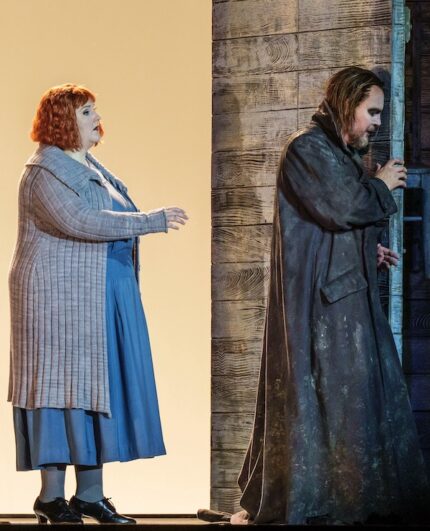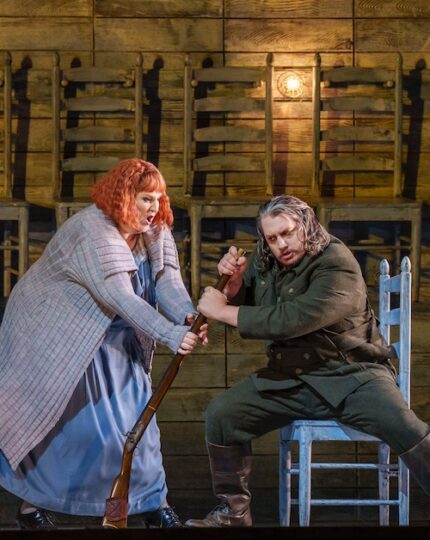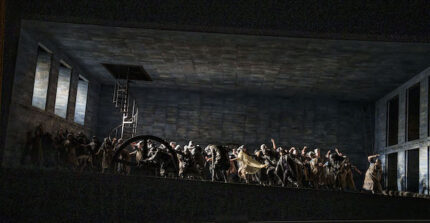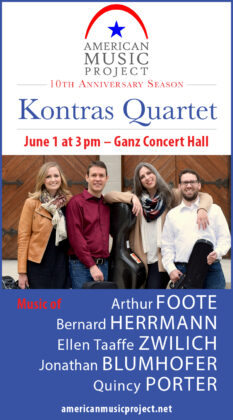Singers shipwrecked by staging in Lyric Opera’s disastrous “Dutchman”

One entered the Civic Opera House Saturday night hoping that, similar to the haunted captain of the Flying Dutchman, the curse of the company’s past 13 years may have finally been lifted.
That didn’t happen. The company’s season-opening performance of Wagner’s The Flying Dutchman was yet another shining exemplar of the leitmotif of the Anthony Freud era—first-class singing thoroughly undermined by a revisionist and execrable production.
The malefactor in this case is director Christopher Alden. In his last Lyric outing in 2000, Alden staged a Rigoletto that put the title jester in a large chair center stage where he sat and glowered at the audience throughout the opera with little interaction with Gilda or the other characters. That production was so widely reviled that Alden was effectively banned from the company roster for 23 years. Naturally it took Freud to bring back this spectacularly giftless hack.
Following the young Richard Wagner’s success with Rienzi, audiences were initially baffled by Der fliegende Holländer at its 1843 Dresden premiere. As with Rienzi, they expected another Meyebeer-esque epic, yet this strange, dark and brooding Germanic opera took its lineage more from Weber. But The Flying Dutchman shows Wagner finding his own voice in this tale of the sea captain cursed to wander the earth, coming ashore every seven years in a search to find a woman that will be faithful to him and relieve his torment.
Im addition to Wagner’s use of musical leitmotivs for his characters (in somewhat embryonic form), Dutchman offers Wagner’s finest overture, rousing choruses for the sailors, and glorious set pieces for the principal singers.
Saturday night’s performance began well with superb singing and a striking unit set that evocatively depicted the deck of Daland’s vessel. Things begin to go seriously awry in Act 2. Instead of happy young girls working at their spinning wheels, the women’s chorus are unsmiling, proletarians in peasant scarves who move their arms in automaton-like, chopping motions (and not very well coordinated). Senta spends most of her time with her back to the audience staring at a Munch-like portrait of the Dutchman. All the male principals wear dark eye makeup like silent-film villains.
Alden’s artistic arrogance is on pretentious display in his “Director’s note” (always an ominous sign) where he has the audacity to wrap himself in the flag of a crusader against anti-Semitism. Alden says his misbegotten staging reflects “my desire to confront head-on the unholy connection between Wagner’s art and the spectres of Fascism and Antisemitism.” Right. That few audience members would get that without reading the note tells you how successful is this inspiration. If you prefer Wagner’s version of The Flying Dutchman you’re probably on the side of the forces of darkness and maybe even a Republican.
Alden’s patented shtick is to take all the humanity and naturalness out of every opera he touches. So characters constantly face walls or away from the audience, emotions are either absent or exaggerated and parodied. Characters become quasi-zombies (like Senta) or caricatures like Erik, her suitor, who is depicted here as a cringing neurotic, menacing himself and others with a long hunting rifle.
The director’s other brainstorm is to elevate minor roles into annoying omnipresent figures silently doing ridiculous things that detract from the principals. So the Steersman instead of disappearing after his opening aria, remains onstage as Daland’s confidante throughout the first act. The tiny role of Mary, who has told Senta of the Dutchman tale, is elevated into a constant irritating and unhinged presence—either hugging or brandishing the Dutchman’s portrait, or taking it off the wall and putting it back on a different wall over and over again. Will you please just get off the stage and go get a job at The Great Frame Up?
Alden saves his worst conceits for the final act. Unlike Wagner’s opera, as Alden’s says of his redo, “Our Senta is a rebel against her closed community identifying with the plight of the outcast.” Of course this is manufactured rubbish and has nothing to do with the actual opera or Senta’s character motivation as envisioned by the composer. So instead of Senta’s sacrificial suicide and a concluding vision of her and the Dutchman transfigured in death, Psycho Erik merely shoots her with his long gun. What an inspiring coda. Too bad tenor Robert Watson didn’t pull an Alec Baldwin and shoot the director in rehearsal instead.
What a waste of a first-class cast.
It’s a testament to the artistry of Tomasz Konieczny—last seen here in 2015 as Wozzeck— that he was able to create a compelling portrayal of the haunted Dutchman despite being hindered at nearly every turn by Alden. (When meeting Senta, Alden has Konieczny silently rest his head on the door for long minutes—like Charlie Brown quietly banging his head on the wall—which induced laughter opening night.)
Unlike many a pushed-down baritone in this role, the Polish singer’s voice has true weight and ballast. He put across a powerful and arresting “Die Frist ist um,” balanced deftly with Tamara Wilson’s Senta in Act 2 and rose to the occasion in the final scene, as much as Alden’s idiocy allowed.

Wilson’s Senta suffered the most from the godawful staging—clad in unfortunate costumes crowned by a bright orange fright wig and often standing still for minutes on end or staring at a back wall. (Why is it that directors of Alden’s ilk so often treat female characters like space aliens and try to make them campy or grotesque?)
Despite Alden’s worst efforts, Wilson sang magnificently, handling the leaps in her Act 2 Ballad with ease, soaring in her duet with Konieczny and making her final scene a vocally thrilling climax even with Alden’s downbeat revisionism.
Mika Kares was in the same elevated league as Daland, the materialistic sea captain who is only too happy to immediately hand off his daughter Senta to the Dutch stranger in exchange for jewels and riches. Apart from overdoing the bibulous bit at the end of Act I, the Finnish singer—last seen here as the Commendatore in Don Giovanni—brought a sense of fun and a sleek, commodious true bass to the role.
As Erik, Robert Watson made a vocally worthy debut singing with ample tone. Unfortunately, Alden makes the hunter—supposedly the “normal” guy in this love triangle—into a twitchy sociopath. This Erik appears so deranged that the depressive Dutchman just seems like he’s having a bad day by comparison.
Ryan Capozzo displayed a vibrant tenor as the Steersman, delivering an ardent account of his Act I sea-faring ode. Too bad Alden undermined the Ryan Center member by making the Steersman a tiresome unwonted presence.
As Mary, mezzo-soprano Melody Wilson made an indifferent company debut with a light voice and muddy diction. Alden did her no favors either turning the benign auntie figure into a clipboard-bearing tyrant who seems more obsessed with the Dutchman’s portrait than Senta.
Allen Moyer’s expressionist unit set was the production’s sole success, a steeply raked long deck for Daland’s ship with fire-lighted depths for the Dutchman sailors underneath. The costumes proved more mixed: on target with the noirish gray-green for the captains’ coats and then veering wildly from camp (the Day-Glo green scarves for the village women) to crudely manipulative (the Dutchman’s striped pajamas supposedly reflecting Holocaust garb in Alden’s cynical scenario).
The men of Michael Black’s chorus delivered resounding renditions of the choruses in the final act, mitigated somewhat by the distracting din of Alden’s overdoing the pounding of feet and glasses. The women were equally committed if less polished in their singing–especially in Act 2 with the bizarre semaphore motions they had to keep straight.
Enrique Mazzola’s conducting was the usual mixed bag. The fail-safe Overture was rough-hewn and tepid with oddly muffled brass. (Who buries the brass in Wagner?). Mazzola kept the score moving efficiently through the unbroken two-and-one-half hours, albeit with a characteristic lack of dramatic intensity.
The conductor’s tendency to drag tempos was manifest in Act II with the extended scene between the Dutchman and Senta slowing to a crawl and then having to rush to get back up to speed. The playing of the Lyric Opera Orchestra was largely solid, though with more then the usual opening-night lapses.
The Flying Dutchman runs through October 7. lyricopera.org

Posted in Performances





Posted Sep 24, 2023 at 10:50 pm by Thomas Sillitti
Thank you for your honesty concerning the dreadful Christopher Alden! After having been drug through horrible productions of RIGOLETTO, LA TRAVIATA, MAHAGONNY, and MACBETH (did I miss any others??) as a chorister at Lyric Opera for over forty years, I had hoped that he and his even less talented brother David had been thrown to the ash heap. But no! How fortunate for the long suffering patrons of Lyric Opera that Anthony Freud, the destroyer of opera companies from here to Wales, was around to bring this bubbling pile of crap back to darken our stage.
Freud has turned a once great company into a minor player on the international stage. I just hope that after having his ass kicked out of Chicago (yeah, I don’t believe he’s “retiring”), he is never again allowed to enter another theater. At least not in a position of power.
Good riddance!
Posted Sep 25, 2023 at 12:18 am by P.Ryan
Thank you for your honest review. I was tempted to buy a ticket for this but had a bad feeling about it. Glad I saved my money!
Please someone send that awful Anthony Freud away yesterday. Everything he touches he destroys. He has brought the once outstanding, world class Lyric Opera to its knees. Shameful!!
Posted Sep 25, 2023 at 7:56 am by Mark
While I find your continual contempt for Freud and Lyric to be exhausting, I will agree with the majority of your thoughts on the staging of this piece. It was unnecessarily pretentious: not in its design aesthetic (I actually appreciate the use of German expressionism), but in the overwrought dramatic pacing and curious character direction. The women’s chorus showed sloppy choreography, but the men’s was stellar.
That said, let’s call it like it is — the plot of the flying Dutchman is ludicrous, and its music is probably better served as a concert than a dramatic production.
Posted Sep 25, 2023 at 10:20 am by rc
So happy I found this. Saturday’s Dutchman was the first Wagner opera I have ever seen (ever!) and when I left I was like “Oh no, was I supposed to think this was great and I just don’t get Wagner?” So this review was a relief.
The director’s note was clarifying on the matter of the prisoner uniforms, the hostility and ominousness of the various choruses, etc., but the reality didn’t realize its ambitions. Many of the analogies in this work seemed incomplete or poorly handled, and many choices seemed fairly obtuse. The portrait as a piece of Weimar (I think?) art was compelling, and though Mary was doing way too much, I felt that her little subplot on the power of art to subvert conformism and drive obsession was nice. The bright green remains a total mystery.
It was satisfying to watch everyone hang that portrait perfectly level each time. Wish the Steersman character hadn’t spent so much time rolling around on the floor. I hope his spine is OK.
Posted Sep 25, 2023 at 10:44 am by jizungu
Though I think the review accurate, its headline is overly harsh, and it would be a shame if it turns people away from a compelling musical performance. (Still, I agree with Mark on whether the Dutchman is ever worth staging anymore.)
I count myself lucky that my eyesight’s apparently weaker than Lawrence Johnson’s, since I missed some of the details he describes. Still, one that he failed to mention stood out: when Senta portentously removed the Dutchman’s overcoat to reveal the striped pajamas of an Auschwitz prisoner. This meaningless pretension was jarringly trivial, bordering on the offensive.
Posted Sep 25, 2023 at 12:05 pm by Peter O'Malley
Too bad it has become so unfashionable to present an opera that follows the intent of the composer and librettist!
Posted Sep 25, 2023 at 6:11 pm by Roger Rocco
I completely agree with your review. The music is the most important element of opera. Wagner’s masterpiece cannot be tarnished by theatrical musings regardless of the composer’s character or political views.
Posted Sep 25, 2023 at 6:33 pm by Jacob Hildner
Further complaints:
The singers on the spiral staircase were out of view and direct ear shot to anyone in the upper balcony — ridiculous oversight.
What was that big iron wheel supposed to be/represent? It was visually striking, but it wasn’t anything like a ship’s helm (steering wheel) or anything I’ve seen on a ship’s deck. And I didn’t think the women were supposed to be in a textile factory with machine-driven looms.
What was with that kelly green stuff for the chorus? What does St. Patrick’s Day have to do with this opera?
It would be super swell if more opera sets looked like actual settings, which can be dazzling on a giant stage.
The story is painfully old-fashioned, but, given a directorial treatment not at war with the material, and with the young Wagner’s musical and dramatic invention, it could prove far more engaging.
Posted Sep 26, 2023 at 2:57 am by Winston Kaehler
Years ago I asked the director of Minnesota Opera about the current tendency toward productions based on directors’ interpretations. He replied,”Well, if you are staging an opera composed in the 1860’s, you wouldn’t stage it as it was in the 1860’s, would you?” Sad, but all too typical.
Posted Sep 26, 2023 at 2:45 pm by Philip Kraus
What the director did to Ms. Wilson in terms of costume and makeup is a crime.
Posted Sep 26, 2023 at 4:53 pm by John
Freud is an absolute disaster.
Posted Sep 26, 2023 at 6:40 pm by Dan F
I left the theater thinking “I’m not sure I understand what the director was going for, but it sure sounded GREAT!” So I agree with your review in parts but also think it’s too harsh. The holocaust imagery definitely did not work for me and I was very confused on what message I was supposed to take away from it. And I agree with the odd stage directions and terrible costume of Tamara Wilson.
But I don’t agree at all with your criticisms of the music! I have enjoyed Mazzola’s conducting thus far, and I thought the 2nd act duet between Senta and the Dutchman, with its varying tempos, was the clear peak of the opera. And the chorus pieces were just fantastic. I would encourage people to hear the wonderful music, which I thought overrode the troubling direction and made this a worthy performance.
Posted Sep 27, 2023 at 11:02 pm by John
Agree with most points here. I’m first and foremost a symphony and ballet goer, but in my opinion, Mazzola is a mistake time and time again. I was in the fourth row tonight (Wednesday, 9/27) and you could hear him grunting over every heavy beat in the opera. Praise be the leads for making music where Mazolla would mince the metric. I’m aware Wagner is always difficult to pull off, but the two tenors sounded out of control and closer to Mozart tenors than heldentenors.
The terrible acting and stage direction harkened to the disastrous Carmen from earlier this year. The directors are insistent on stripping all chemistry from characters or the time to interact. I was looking around astonished that I was wasting my time watching the Dutchman grind his head into the door. The only thing that I thought was possibly interesting was the interpretation of Mary as the Devil.
In any case, I am left with the wonder of “what’s left?” in Chicago? The symphony is at a crossroads with Muti leaving but my hopes are high. The Joffrey has been on the rise in my opinion, with Anna Karenina being an absolute delight. Steppenwolf’s Describe the Night was a triumph. COT has been improving.
But having attended Lyric’s Magic Flute (vocally very weak), Carmen (poorly acted and the worst Escamillo I’ve heard), and now this (vocally very strong, but bizarre in many ways), I guess we just have to hope that new faces will make Lyric worthwhile again, because it has chased away several of my theater companions already.
Posted Sep 28, 2023 at 1:29 am by JG
The review and comments are consistent with my reaction to the September 27 showing.The orchestral music was wonderful, but…
If the Dutchman finds himself cursed because he invoked the Devil, doesn’t equating him with a Holocaust prisoner suggest that the Holocaust was due to Jewish people invoking the Devil, or at least that they brought it on themselves?
Senta’s commitment to obedience and loyalty, first to her father, and subsequently professed to the Dutchman is probably the most consistent and repeated theme from beginning to end. How does Alden think that makes her a “rebel against her closed community identifying with the plight of the outcast”? She is an outcast because she has accepted an offer to marry a wealthy sea captain? Who treats her as an outcast?
What’s with the fluorescent green? I could go on, but the problems are already well described in the review and other comments.
Posted Sep 28, 2023 at 11:39 am by GCMP
It’s hard to keep the Aldens straight as they both do wretched things to the opera. But I think Christopher Alden is slightly more endurable than his brother David.
Tamara Wilson needs to stand up and demand some diva privileges. She had bad costumes in Ernani (does no one at Lyric know how to fit clothes any more or is that an economy measure?) and the Senta costume and wig are downright embarrassing. She deserves so much better.
Posted Sep 28, 2023 at 12:09 pm by Cipa
I hope this (quite accurate) review will not discourage people from attending the show, as the singing is simply incredible. Much of the staging didn’t bother me as much as it did the reviewer, but the Nazi and Holocaust allusions were flat out offensive. It would not surprise me if donors complain.
I stood with a group of strangers in the Poetry Garage last night trying to figure out the allusions, and we just couldn’t. If the Nazi arm bands (in florescent green, for some reason), the modified Heil Hitler salute, and the worship of the painting of the Dutchman were supposed to make the Dutchman Hitler (or at least fascism personified), then why were he and his crew wearing concentration camp uniforms? And if I have it backwards and the production was saying the Dutchman was Jewish, does that mean Jews were in league with the devil and tried to buy themselves out of trouble since they were super rich? Does the Lyric leadership not see how offensive that all is? Or don’t they see that it just doesn’t make sense and totally detracted from the opera itself?
One last note: I’m sorry, but the orchestra should have been much better. It was the one musical disappointment of the evening, though as I said I’m glad I was there for the singing. (And kudos to the lighting designer, too. First rate job.)
Posted Sep 30, 2023 at 12:17 am by MM
Mr. Johnson’s review is, as always, on point. Poor singers! The direction was so bad, it was actually funny! I interpreted the main heroine, based on her costume and the horrid red wig, to be a Nazi vixen. Erik reminded me of the hunters from Disney’s Peter and the Wolf. I did not read the directos note, and so I thought that the Dutchman was a convict from the gallows. And my 14-year old son solved the mystery of the neon green color: it was from SpongeBob (there was a neon green Flying Dutchman in there)!
Unfortunately, it was not funny enough to become a parody, and I felt bad for the romantic story, that could have still tugged at the listeners heartstrings, if only staged right. As it was, while the show was entertaining, I felt bad for the great singers, who were turned into caricatures.
Posted Oct 06, 2023 at 9:38 pm by Chilynne
Saw this past Wednesday’s matinee performance. Marvelous singers and orchestra (the brass!!!), but risible staging, ugly costumes, and a dangerously raked stage.
Cannot remember when a production has so screamed for a concert performance.
Posted Oct 08, 2023 at 2:23 am by Robert
Just got home from the final performance (Oct 7). The production was illogical nonsense, but I’ve seen far worse. Were the lime green costumes and lighting an homage to the Bayreuth Lohengrin with its electric lime green Gottfried? Why was Eric singing of his longing and loving for Senta while practically sitting in Daland’s lap? I could go on, but others already have.
The singing was first rate. The chorus was great. The orchestra played beautifully. But all their effort was tossed into a bowl of endless legato Mazzola mush. Everything sounded alike. Every section of the orchestra could be heard at the same volume at the same time, at all times. Only in the last two minutes was there any attempt at a strong attack on a note or phrase.
If Lyric wants to regain its reputation as a first-rate, world class company (one can hope), it needs to give us a Dutchman conductor who has some experience with Wagner, not one who is conducting his first measure of any romantic German opera with these performances. It’s embarrassing to have your Music Director learn to tie his shoes while on the job.